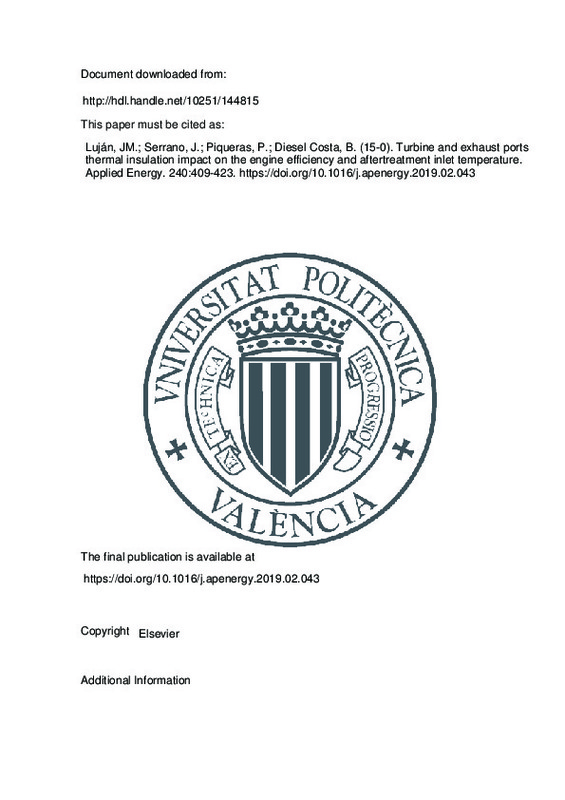JavaScript is disabled for your browser. Some features of this site may not work without it.
Buscar en RiuNet
Listar
Mi cuenta
Estadísticas
Ayuda RiuNet
Admin. UPV
Turbine and exhaust ports thermal insulation impact on the engine efficiency and aftertreatment inlet temperature
Mostrar el registro sencillo del ítem
Ficheros en el ítem
| dc.contributor.author | Luján, José M.
|
es_ES |
| dc.contributor.author | Serrano, J.R.
|
es_ES |
| dc.contributor.author | Piqueras, P.
|
es_ES |
| dc.contributor.author | Diesel Costa, Barbara
|
es_ES |
| dc.date.accessioned | 2020-06-02T05:37:12Z | |
| dc.date.available | 2020-06-02T05:37:12Z | |
| dc.date.issued | 2019-04-15 | es_ES |
| dc.identifier.issn | 0306-2619 | es_ES |
| dc.identifier.uri | http://hdl.handle.net/10251/144815 | |
| dc.description.abstract | [EN] Worldwide emission regulations are driven the efforts of the automotive industry to meet challenging targets concerning pollution reduction. Nowadays, advances in exhaust aftertreatment systems are primarily required to achieve regulation requirements within the whole engine operating range. Nevertheless, flow parameters, such as the exhaust gas temperature, must be also addressed. This makes engine calibration a fundamental step, but also leads to reconsider the passive design of the exhaust line as a way to improve the engine efficiency. Under this context, a study has been conducted to explore the benefits of heat losses limitation looking for aftertreatment inlet temperature increase at the same time fuel economy is improved. To do so, a baseline diesel engine has been modeled using a gas dynamic software taking special care of the heat transfer processes in the exhaust. The investigation covers the definition of different strategies for exhaust ports and turbine thermal insulation, which are evaluated in a representative range of steady-state operating conditions. As a first step, the theoretical limits and representative technology solutions are considered for each exhaust region. Then, a combination of the most promising strategies has been computed to provide a comprehensive database and analysis of the potential of passive exhaust heat losses control. | es_ES |
| dc.description.sponsorship | This research has been partially supported by FEDER and the Government of Spain through project TRA2016-79185-R. Additionally, the Ph.D. student Bárbara Diesel has been funded by a grant from the Government of Generalitat Valenciana with reference ACIF/2018/109. | es_ES |
| dc.language | Inglés | es_ES |
| dc.publisher | Elsevier | es_ES |
| dc.relation.ispartof | Applied Energy | es_ES |
| dc.rights | Reserva de todos los derechos | es_ES |
| dc.subject | Emissions regulation | es_ES |
| dc.subject | Diesel engine | es_ES |
| dc.subject | Exhaust aftertreatment system | es_ES |
| dc.subject | Turbine outlet temperature | es_ES |
| dc.subject | Exhaust thermal insulation | es_ES |
| dc.subject | Fuel consumption | es_ES |
| dc.subject.classification | MAQUINAS Y MOTORES TERMICOS | es_ES |
| dc.title | Turbine and exhaust ports thermal insulation impact on the engine efficiency and aftertreatment inlet temperature | es_ES |
| dc.type | Artículo | es_ES |
| dc.identifier.doi | 10.1016/j.apenergy.2019.02.043 | es_ES |
| dc.relation.projectID | info:eu-repo/grantAgreement/MINECO//TRA2016-79185-R/ES/Desarrollo de herramientas experimentales y computacionales para la caracterización de sistemas de post-tratamiento de gases de escape en motores de encendido por compresión/ | es_ES |
| dc.relation.projectID | info:eu-repo/grantAgreement/GVA//ACIF%2F2018%2F109/ | es_ES |
| dc.relation.projectID | info:eu-repo/grantAgreement/MINECO//TRA2016-79185-R/ES/DESARROLLO DE HERRAMIENTAS EXPERIMENTALES Y COMPUTACIONALES PARA LA CARACTERIZACION DE SISTEMAS DE POST-TRATAMIENTO DE GASES DE ESCAPE EN MOTORES DE ENCENDIDO POR COMPRESION/ | es_ES |
| dc.rights.accessRights | Abierto | es_ES |
| dc.contributor.affiliation | Universitat Politècnica de València. Departamento de Máquinas y Motores Térmicos - Departament de Màquines i Motors Tèrmics | es_ES |
| dc.description.bibliographicCitation | Luján, JM.; Serrano, J.; Piqueras, P.; Diesel Costa, B. (2019). Turbine and exhaust ports thermal insulation impact on the engine efficiency and aftertreatment inlet temperature. Applied Energy. 240:409-423. https://doi.org/10.1016/j.apenergy.2019.02.043 | es_ES |
| dc.description.accrualMethod | S | es_ES |
| dc.relation.publisherversion | https://doi.org/10.1016/j.apenergy.2019.02.043 | es_ES |
| dc.description.upvformatpinicio | 409 | es_ES |
| dc.description.upvformatpfin | 423 | es_ES |
| dc.type.version | info:eu-repo/semantics/publishedVersion | es_ES |
| dc.description.volume | 240 | es_ES |
| dc.relation.pasarela | S\379777 | es_ES |
| dc.contributor.funder | Generalitat Valenciana | es_ES |
| dc.contributor.funder | European Regional Development Fund | es_ES |
| dc.contributor.funder | Ministerio de Economía y Competitividad | es_ES |
| dc.subject.ods | 07.- Asegurar el acceso a energías asequibles, fiables, sostenibles y modernas para todos | es_ES |







![[Cerrado]](/themes/UPV/images/candado.png)

